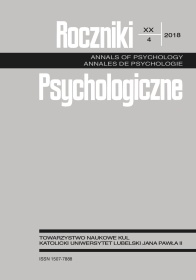The Free Will and Determinism Plus (FAD–Plus) scale: The validity and reliability of the Polish adaptation
The Free Will and Determinism Plus (FAD–Plus) scale: The validity and reliability of the Polish adaptation
Author(s): Blanka Kondratowicz-Nowak, Joanna Duda, Jakub Wierzbicki, Anna Maria ZawadzkaSubject(s): Social Sciences, Psychology, Personality Psychology
Published by: Towarzystwo Naukowe KUL & Katolicki Uniwersytet Lubelski Jana Pawła II
Keywords: belief in free will; determinism; unpredictability; subjective well-being; tool adaptation
Summary/Abstract: The article presents an analysis of the validity and reliability of the FAD-Plus scale by D. L. Paulhus and J. M. Carey, which is used to measure beliefs in free will, determinism, and the unpredictability of events. The results of three studies are presented. Based on the results of the first study, it was found that the tool has a consistent structure and that its 3-factor 16-item version is reliable. The second study revealed positive correlations between determinism and religious fundamentalism and belief in an unjust world as well as a positive correlation between belief in unpredictability and belief in an unjust world. The correlations of belief in free will with authoritarianism, belief in an unjust world, and religious fundamentalism were not significant. The third study revealed a positive correlation between belief in free will and positive emotions, a negative correlation between belief in determinism and positive emotions, and negative correlations of belief in determinism and belief in unpredictability with life satisfaction. The analysis of the FAD-Plus scale for the Polish sample proves that the 3-factor scale (the 16-item version) consisting of subscales measuring beliefs in free will, determinism, and unpredictability, is a parametrically satisfactory tool.
Journal: Roczniki Psychologiczne
- Issue Year: 21/2018
- Issue No: 4
- Page Range: 345-364
- Page Count: 20
- Language: English

